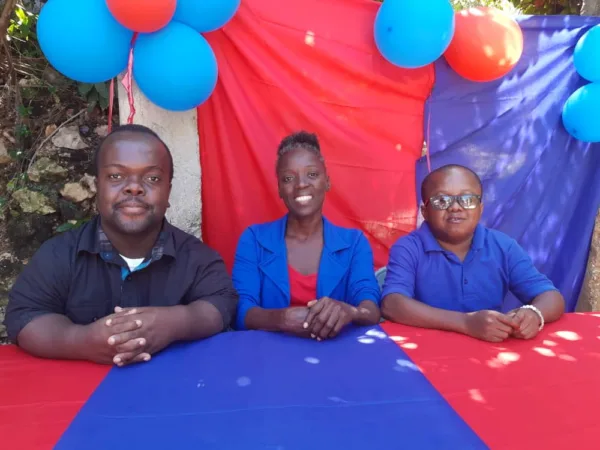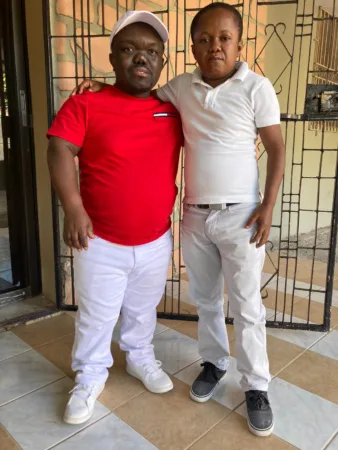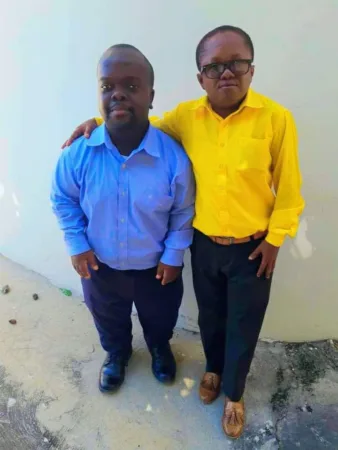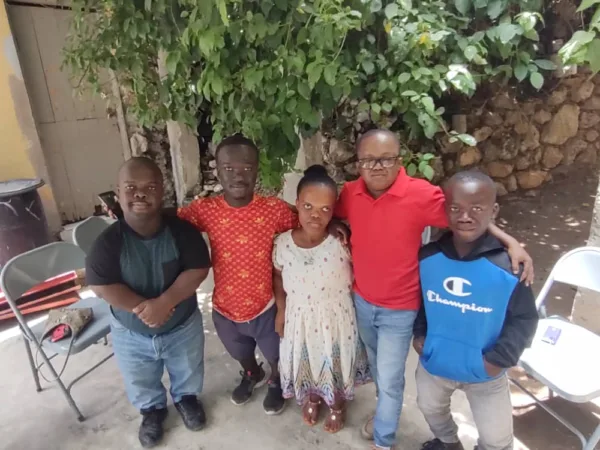If occupying public spaces is a victory, finding a job is a miracle, according to interviews conducted by AyiboPost with three Haitian people suffering from dwarfism
“Biological abnormality.”
“Half-woman.”
And other hurtful qualifiers…
The streets of Port-au-Prince burst Muriette Jean-Baptiste’s eardrums.
The constant verbal and psychological violence sometimes turns into physical aggression even within her family.
In 2017, a vaginal hemorrhage struck the young woman for eight days, after a violent and unjustified attack by her own brother.
“No one thought of taking me to the hospital, because I am unloved in my family because of my disability,” laments Jean-Baptiste to AyiboPost.
Suffering from dwarfism, doctors diagnosed the lady with osteogenesis imperfecta. It is a collagen disease, leading to the abnormal and generalized fragility of bones.
People affected by this hereditary disability are often very short.
But Haitian society, whose laws do not systematically punish discrimination, does not always show leniency.
No one thought of taking me to the hospital, because I am unloved in my family because of my disability.
Jean-Baptiste’s body, 1m18 (3 ft, 8 in.) tall, still retains the memory of abuse from her family: her mouth is missing four teeth – the result of repeated blows to the face from her mother, according to her.
Other families, like that of Wesley Ed Isidore, are more kind.
However, the streets remain hostile.
To go out, the computer technology student in a vocational school in Port-au-Prince is often “accompanied because of people’s mockery”.
Inappropriate gestures are never far away. “In the street, says Isidore, sometimes people take out their cell phones and take a picture or video of me without my consent: that annoys me.”
Read also: Viols, harcèlements… le lot des femmes qui vivent avec un handicap en Haïti
Many people with dwarfism are unable to complete their studies because of mockery and harassment in schools, explains Sheilla Privert, vice-president of the Athletic Association for Little People of Haiti (AAPPTH ) to AyiboPost.

Wesley Ed Isidore, Secretary General of AAPPTH, Sheilla Privert, Vice President, and Nitoyson Exantus, President, at an event at the headquarters of the Organization of Underprivileged and Handicapped Children of Haiti (OEDHH) in October 2023.
Esther Simon, who is still supported by her parents at 31, says she suffered this fate.
“My classmates were always annoying me,” says Simon. “Sometimes, I insulted them so that they would leave me alone,” recalls the lady who finally ended her studies after her 6th year final exams.
Sexual allusions and assault are also common. “Often, strangers look at me and say that they imagine me in their beds,” says Vastie Jean, 30, who suffers from curvature of the legs.
Members of this community are sometimes forced to adopt defense mechanisms.
According to Pascal Nery Jean-Charles, president of the Haitian Psychology Association (AHPSY), they “often put themselves aside, because they anticipate people’s mocking remarks. Likewise, continues the specialist, they can adopt aggressive and violent behavior in relation to the discriminatory charge they face.”

From left to right: the Haitian comedian nicknamed Bri Sapat and Nitoyson Exantus.
If occupying public spaces isa victory, finding a job is a miracle, according to interviews conducted by AyiboPost with three people suffering from dwarfism.
Nitoyson Exantus, 1m34 (4 ft, 3 in.), is one of the exceptions in this community where prejudice seems to keep people unemployed, much more than the overall tightening of the job market in Haiti.
Exantus’ relative success has not been a smooth ride. Before joining public administration as an accountant at the Ministry of Education and Vocational Training (MENFP), following a contest in October 2020, Exantus had, six years earlier, succeeded — according to his statements — with flying colors in a contest to work at a bank in Gonaïves.
At the time, Exantus did not get the job. If no official explanation was provided, the accounting graduate from the Public University of Gonaïves (UPAG) learned about the unflattering details about the recruitment process from people close to the institution.
“They didn’t see fit to bother with someone of my stature because I would have needed a much higher chair so that I could see the customers and a small bench for my feet which, otherwise, would not touch the ground,” reports Exantus.

From left to right: Wesley Ed Isidore and Nitoyson Exantus, secretary general and president of the AAPPTH.
Today, the man tries to help his community by chairing the Athletic Association for Little People of Haiti (AAPPTH), created on December 15, 2018.
This institution, which brings together nearly twenty people affected by dwarfism across the country, is working to force the Haitian state to respect the International Convention on the Rights of Persons with Disabilities adopted by the United Nations General Assembly on December 13, 2006.
Ratified by the Haitian government in 2009, this convention prohibits violence, exploitation, and the mistreatment of people living with disabilities.
The state does little to combat discrimination or to encourage the hiring of members of the community according to the AAPPTH.

Members of the AAPPTH
Since 2018, the Office of Human Resources Management (OMRH) and the Office of the Secretary of State for the Integration of People with Disabilities (BSEIPH) have organized an annual competition to employ 50 people with disabilities in the public service.
Although welcome, this initiative works haphazardly, according to testimonies. In an article published by AyiboPost on June 5, 2020, 50 winners demanded their effective integration into public administration, two years after the competition in 2018.
The social assistance fund (CAS), a state institution helping the most deprived, is unable to properly fulfill its mission in a context where the current Minister of Social Affairs and Labor who heads the institution, Pierre Ricot Odney, as well as former executives, have been indicted for corruption by an investigating judge.
Often, strangers look at me and say they imagine me in their beds.
When Muriette Jean-Baptiste’s small hairpiece business went bankrupt in 2022, after five years of operating with difficulty, she went to the CAS as a last resort.
“They took my papers, and there was complete silence,” laments Jean-Baptiste who says he had no luck with the BSEIPH either.
Contacted by AyiboPost, Boyer Breithner, the logistics and communications manager of the CAS, maintains that the institution is making efforts to provide financial support to the needy.
Genard Joseph, Secretary of State for the Integration of Disabled People, could not be reached before publication.
Also read: Killed because they couldn’t hear
Specialists are calling for campaigns to combat discrimination against people with dwarfism. They also demand effective programs to hire them, as well as effective measures to combat harassment.
In the meantime, community members continue to demonstrate resilience in the face of discrimination.
“I didn’t choose to be like this,” says Nitoyson Exantus. “I strive every day to come into agreement with this truth. In need of changing my reality, I decided to live it,” he concludes.
English translation by Sarah Jean.
Cover image: Members of the AAPPTH
Gardez contact avec AyiboPost via :
► Notre canal Telegram : cliquez ici
► Notre Channel WhatsApp : cliquez ici
► Notre Communauté WhatsApp : cliquez ici







Comments